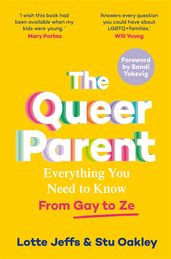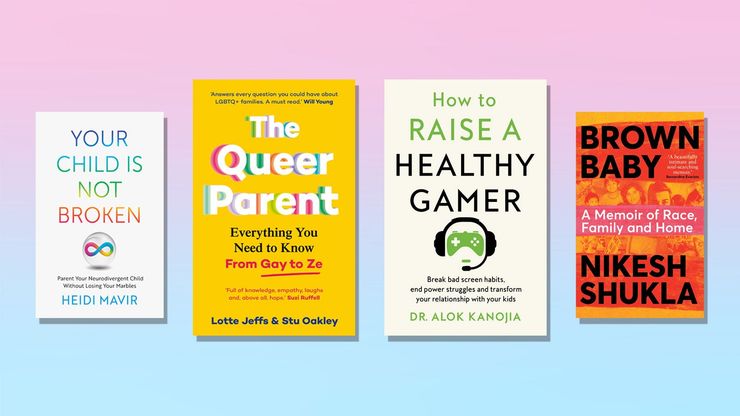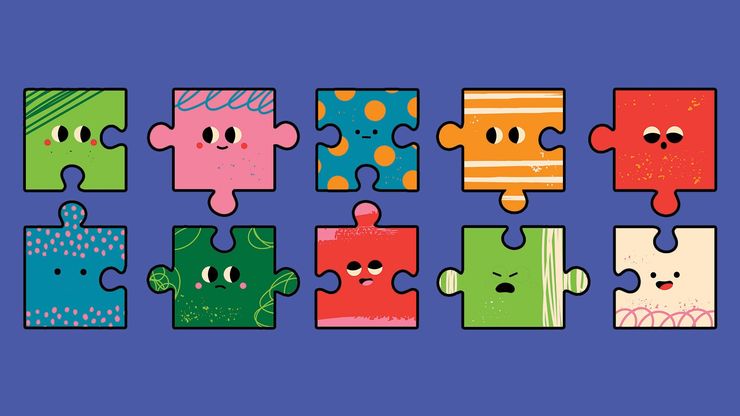'To envision a future and a family that feels happy, safe and supported. This is what everyone deserves': Lotte Jeffs on trans parenting
Whether you transition later in life after having children or are considering what a transition might mean for future fertility or other routes to parenthood, Lotte Jeffs, co-author of The Queer Parent, explores some of the things to consider.

LGBTQ+ people have more options than ever before when it comes to starting a family, but a lack of both focused information and mainstream representation can leave parents, prospective parents, friends and relatives in the dark. The Queer Parent is designed to help change this, providing a must-have parenting toolkit for the LGTBQ+ community. Here, co-author Lotte Jeffs focuses in on trans parenting, outlining some of the things trans parents, parents-to-be or anyone looking to support them, need to consider.
In terms of the way the media presents transgender people and their ‘issues’, the fear and misunderstanding and outright falsehoods that permeate politics and society about them, trans people, let alone trans parents and parents-to-be are probably where gay and lesbians were in the 1980s – seen as problematic, a threat and unworthy.
Whenever we celebrate our wins as gay, bi and lesbian people (and these wins are feeling few and far between at the moment, particularly when we acknowledge the rise of the Far Right across Europe) we know that until our trans friends are treated fairly, particularly in areas of healthcare and family planning, there is still a long way for us to go. And for us to go together.
Speaking out
When we were researching our book The Queer Parent we spoke to Dr Sam Hall, a trans man and father who works as a GP in Brighton and specializes in trans healthcare. He talked to us about his own transition and also his experiences working with young trans people. He told us, ‘the pressures are from all angles for trans people to not even think about having a baby, let alone try. There are so many deep and unpleasant nuances around trans people having children. It’s only as trans rights have become a bit more mainstream, and we’ve become more vocal, that people are coming out of the shadows and losing their shame and fear to talk about their lives.’
There are many excellent trans parent role models who share their experiences on social media, proving that becoming a parent is not just possible, but joyful. Single Dad Freddy McConnell is one of them. He has been campaigning to be legally recognized as his children’s father on their birth certificate. Despite having legally changed his gender to male, because Freddy was the gestational parent to his children – this means he conceived and birthed them – the only option is for him to be listed as ‘mother’ on their birth certificate. Which is deeply problematic. The birth certificate is a piece of paper, it’s admin, but it matters and the fact it doesn't reflect the reality of his family shows how far we have to go in achieving equality for trans parents.
‘According to a 2018 Stonewall report almost half of the people who identified as transgender had thought about taking their own life in the past year. This sobering statistic reminds us of what a privilege it is to be able to envision a future and a family and strive for it in a way that feels happy and safe and supported.’
The privilege of parenting
Because of the prejudice, the harassment and difficulty in accessing health care and support that many trans people face, there is an epidemic of poor mental health among this community. According to a 2018 Stonewall report (unfortunately at the time of writing there are no more up-to-date statistics available) almost half of the people who identified as transgender had thought about taking their own life in the past year.
The need to preserve one’s own life of course takes precedence over the desire to have children and this sobering statistic reminds us of what a privilege it is to be able to envision a future and a family and strive for it in a way that feels happy and safe and supported. This is what everyone deserves, but at the moment it’s far from everyone’s reality.
Difference within difference
Just like there is no single gay parenting experience, within the trans community, routes to parenthood are many and varied. A young trans woman contemplating storing sperm pre-transition to allow her the possibility of becoming a biological parent one day is in a very different position to a trans woman with teenage kids who has come out and begun a transition in her fifties. Some trans men want to give birth, others might have stored their eggs and started a family with the help of a surrogate or partner. All trans people have the potential to be approved as adopters or foster carers.
When we were writing our book, one of the things we loved most was discovering the brilliant diversity that exists within the LGBTQ+ parenting experience. If we listen to each other’s experiences and share our own we can learn so much. Being better informed about what matters to our queer brothers, sisters and non binary siblings makes us more powerful as a community.
‘Everyone we spoke to cited honesty, communication, love and compassion as the key ingredients for navigating a parent’s transition as a family.’
Coming out as trans when you are already a parent
Many people wait until their children are fully grown before giving themselves permission to explore their identity and potentially come out as trans or non-binary. Throughout the book we’ve spoken to people whose partnerships and relationship with their kids thrived, and some people who had to make a horrible choice between their family and their own ability to keep existing in this world. Everyone we spoke to cited honesty, communication, love and compassion as the key ingredients for navigating a parent’s transition as a family.
Preserving your fertility before a medical transition
Supporting a young trans person through any gender dysphoria is the most important thing, as this is key to that person’s happiness and mental health. Without this, it can be hard for them to conceive of their adulthood at all, let alone to consider that they may want to become parents.
When a young person comes out as trans, their future fertility is often one of the last things on their mind. Not many pre teens have a clue if they want to become parents one day – their future is abstract. But doctors and specialists should do what they can to help support young people in making decisions about their transition that will serve them in the short term but also give them options in terms of becoming a parent when they are older. Essentially though, with the right support, with access to up to date information and with role models to pave the way, there are many options for trans people to consider when thinking about becoming parents or when redefining their existing families post-transition. You’ll find more information, personal stories and a whole lot of trans joy in our book The Queer Parent.
The Queer Parent
by Lotte Jeffs and Stu Oakley
This informative, funny and empowering book from the hosts of the award-winning podcast Some Families is the must-have parenting toolkit for the LGTBQ+ community, their friends, family and allies. 90% of queer parenting is just . . . parenting, but being LGBTQ+ when you’re a parent does bring with it a host of conundrums that mainstream guides – which tend to assume heterosexuality – do not address. Authors Lotte Jeffs and Stu Oakley spoke to dozens of experts and queer families, and this hugely-needed book is the product of those conversations and their own experiences of becoming parents through intrauterine insemination and adoption respectively.
Celebrate diversity with the best LGBT books.
Author photo (c) Holly Falconer



